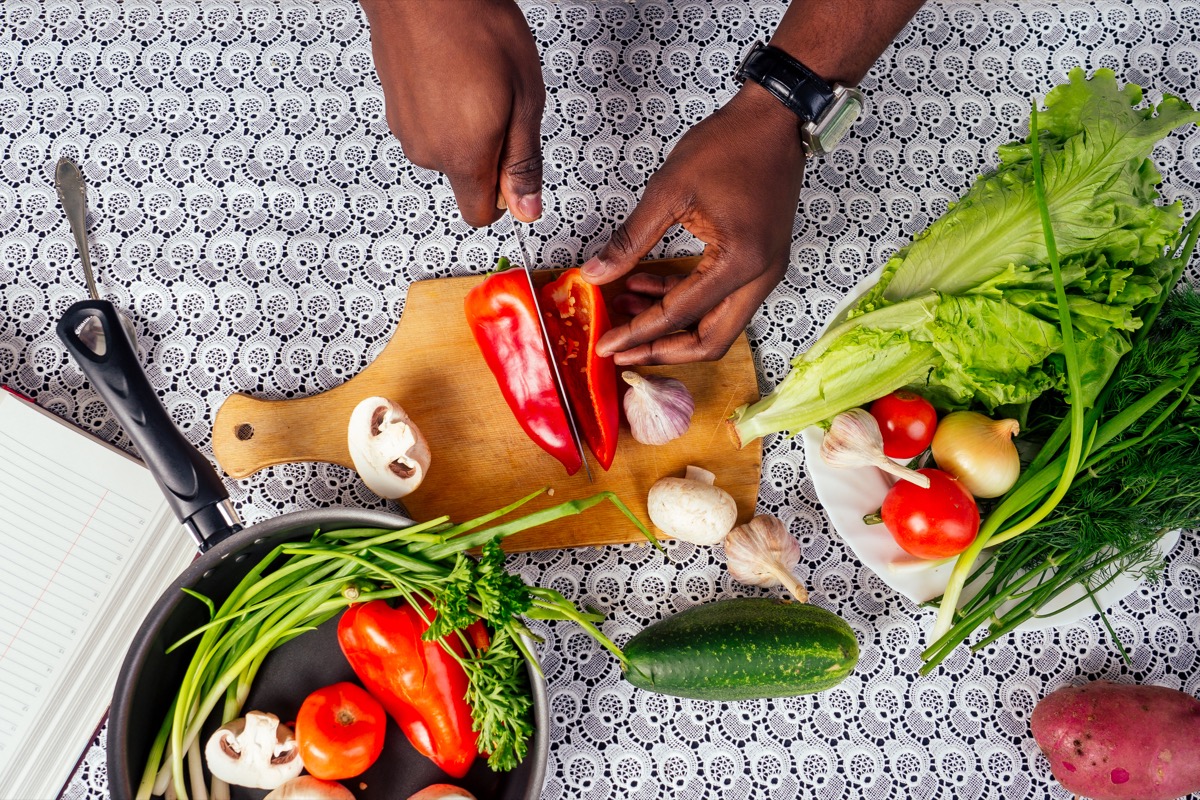The Best Way to Eat for Your Microbiome and Improve Gut Health

Eckhart Tolle once said, "you are not your thoughts." Mentally, that might be the case, but as far as what experts consider your "second brain," aka the gut microbiome, is concerned, you definitely are what you eat.
If the term "microbiome" isn't registering, it refers to the trillions of microorganisms residing in the human body, says Dr. Jim LaValle, clinical nutritionist, pharmacist, and featured expert on Probiotics.com. The vast majority of these microorganisms exist in the large intestine, LaValle explains, but you have bacteria lurking all over your body—in your mouth and on your skin.
According to Grace Derocha, a registered dietitian, certified diabetes educator, and certified health coach at Blue Cross Blue Shield of Michigan, your gut microbiome alone hosts up to 1,000 different species of bacteria (on average), with each type performing its own function. "A small number [of microbes] may try and cause diseases and illnesses such as gut inflammation and fatty liver disease," Derocha explains. "But the majority of gut bacteria play a crucial role in maintaining a healthy heart, weight, proper digestion, and can even produce vitamins B and K."
In other words, it's normal to have good and bad bacteria co-existing in your gut microbiome, and elsewhere in the body, too. But when there is an imbalance of good and bad bacteria in the gut microbiome specifically, your physical, as well as your mental health, can be negatively affected.
Essentially, it's important to know how to eat for your microbiome in order to keep the peace. Here's a breakdown of what you need to know in order to fuel your gut microbiome the right way for better gut health.
How is the gut microbiome connected to your entire body?
Have you ever found yourself in a situation where the best solution you could think of was to just, as they say, "trust your gut?" Well, your body trusts your gut a lot, and that's because your gut microbiome is connected to your digestive system, says Dr. Niket Sonpal, a New York-based internist, gastroenterologist, and adjunct professor at Touro College.
"[The gut microbiome] is a determining factor in how your metabolism functions and how many calories you can intake, what nutrients you extract from those calories, and how those nutrients are converted into things your body needs to function," Sonpal explains. The gut microbiome can also "cause fiber to turn into fatty acids," he adds, "which can cause diabetes type 2 and obesity if left to accumulate in the liver."
In addition to your gut microbiome controlling your body's digestion, one of its main functions is to regulate your immune system in the gut. LaValle explains that when antibodies become overactive to an environmental or food allergens, your body becomes less focused on taking care of other parts of the immune system, which can lead to autoimmunity, when organisms attack healthy cells and tissue.
"A dysregulated immune system is also a source of a tremendous amount of inflammation in the body, which can cause pain throughout the body and damage to the intestines themselves as well as many other parts of the body, such as the lining of the arteries," LaValle says.
In other words: When the health of your gut microbiome is compromised, you're going to feel it everywhere.
Does the gut microbiome affect your mental health?
How you feel mentally can directly affect how you feel physically, and vice-versa. Because your gut microbiome has such a significant impact on your physical health, it's no surprise the system can alter your mood as well.
One of the most prominent ways the gut microbiome affects your mental health is through its serotonin production. Serotonin—known as "the happy hormone"—is believed to regulate anxiety, happiness, and mood. And although serotonin is a brain neurotransmitter, "it is estimated that 90 percent of the body's serotonin is made in the digestive tract." Derocha tells us As a result, it's possible that people who experience feelings of depression have a gut microbiome that's producing low levels of the chemical, Derocha explains.
"The gut microbiome is known as the brain in the gut for a reason," adds LaValle. "A lot of mood-regulating neurotransmitters are made there and when the gut is not healthy it can influence the neurotransmitters and create excessive and/or deficient levels in the gut itself and throughout the body."
What sorts of foods compromise your microbiome?
Whitney Tingle and Danielle DuBoise, co-founders and co-CEOs of organic meal delivery service Sakara Life, built their brand with the intention to deliver whole-food, plant-based options that promote a healthy mind-body connection through the gut. Although Tingle tells us Sakara Life doesn't believe in vilifying foods per se, anything that doesn't support the growth of good bacteria—processed foods that dehydrate the colon, therefore inviting harmful pathogens and sugar-loving bacteria to thrive—shouldn't make up the majority of your diet. Think alcohol, foods sweetened with artificial sugars, red meat, and saturated fats.
"The incredible thing about our bodies, is that the more you eat for your gut through high quality, diverse array of organic plants, the more your body can handle and acclimate to those days when French fries and dirty martinis are on the menu," Tingle says. Remember, everything in moderation is key.
How can you eat to balance your microbiome?
To support the microbiome really is to nourish the "control center" of the body, Duboise says, and the number one way you achieve this is by getting enough plant fiber.
"According to the National Institutes of Health, you have 10 times as many bacterial cells in your body as human ones! There are both symbiotic (good) and pathogenic (bad) varieties—and the good kind thrive on plant fiber," Duboise says. "Eating a clean, plant-rich diet and taking a high-quality probiotic will help you cultivate a diverse and thriving gut microbiome, thereby improving overall health."
Derocha adds that these foods are also good for your gut.
- greens
- fruits
- veggies
- whole-grain foods high in fiber
- dark chocolate
- kefir
- kombucha
- pickles
- sauerkraut
- yogurt
- asparagus
- bananas
- garlic
- leeks
- oat/barley
- onion
Now you're all set to fuel your gut microbiome the right way.








